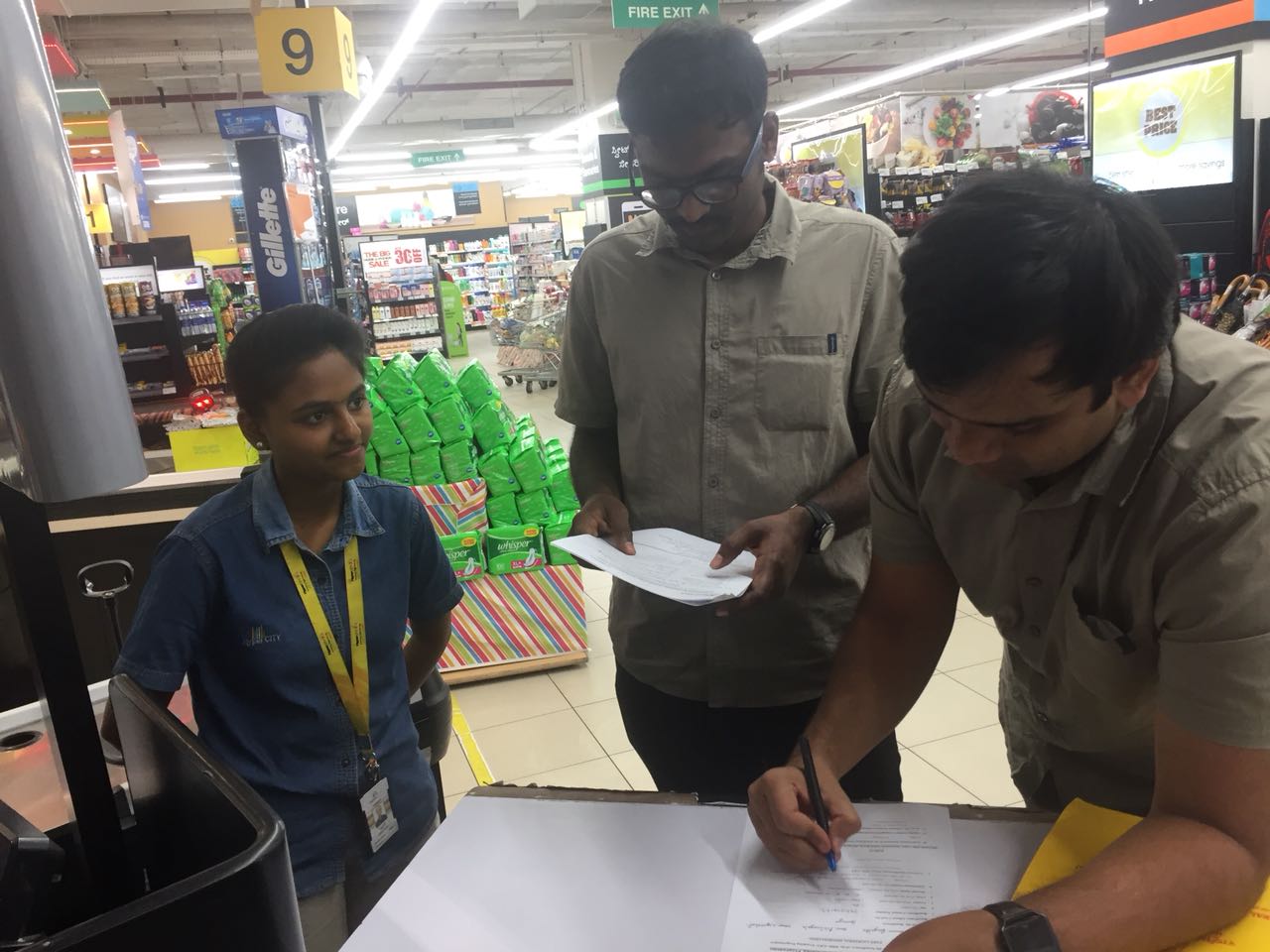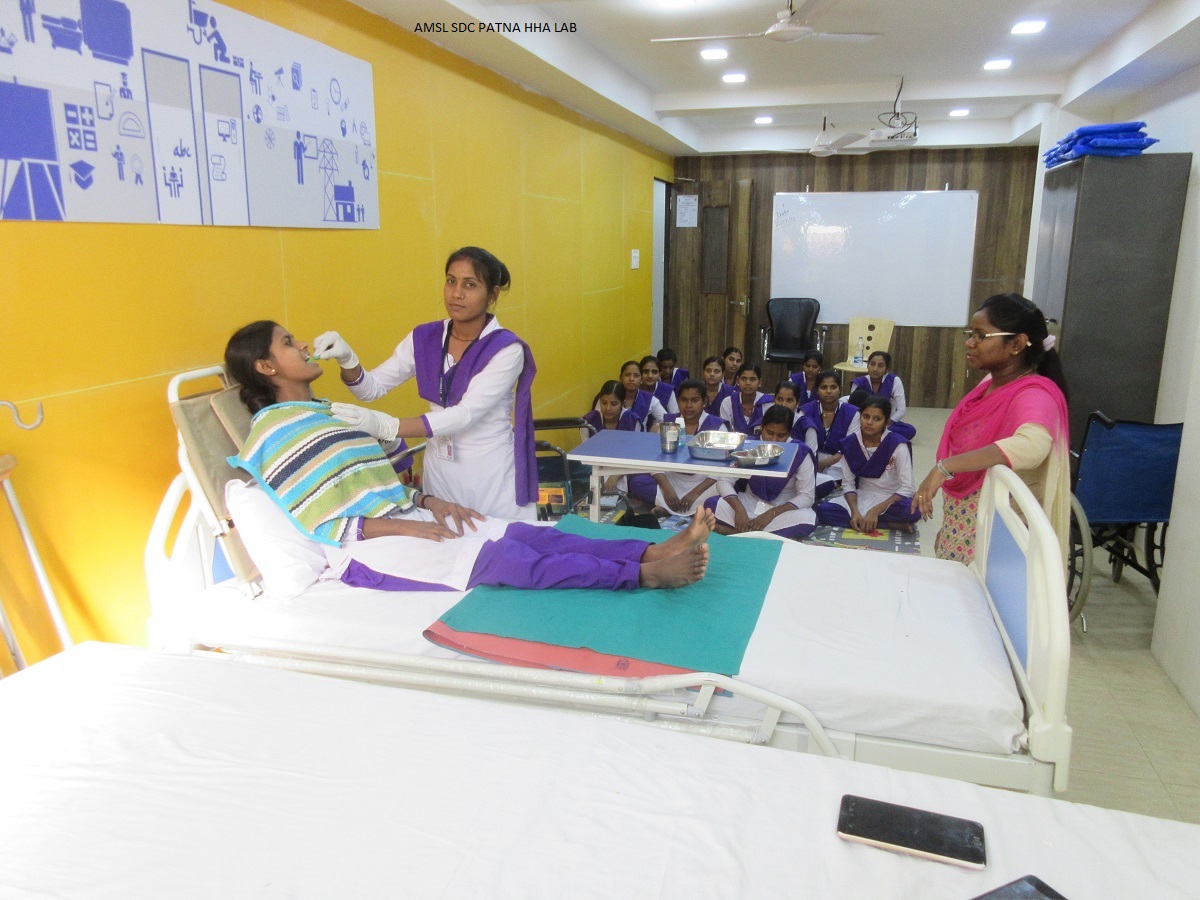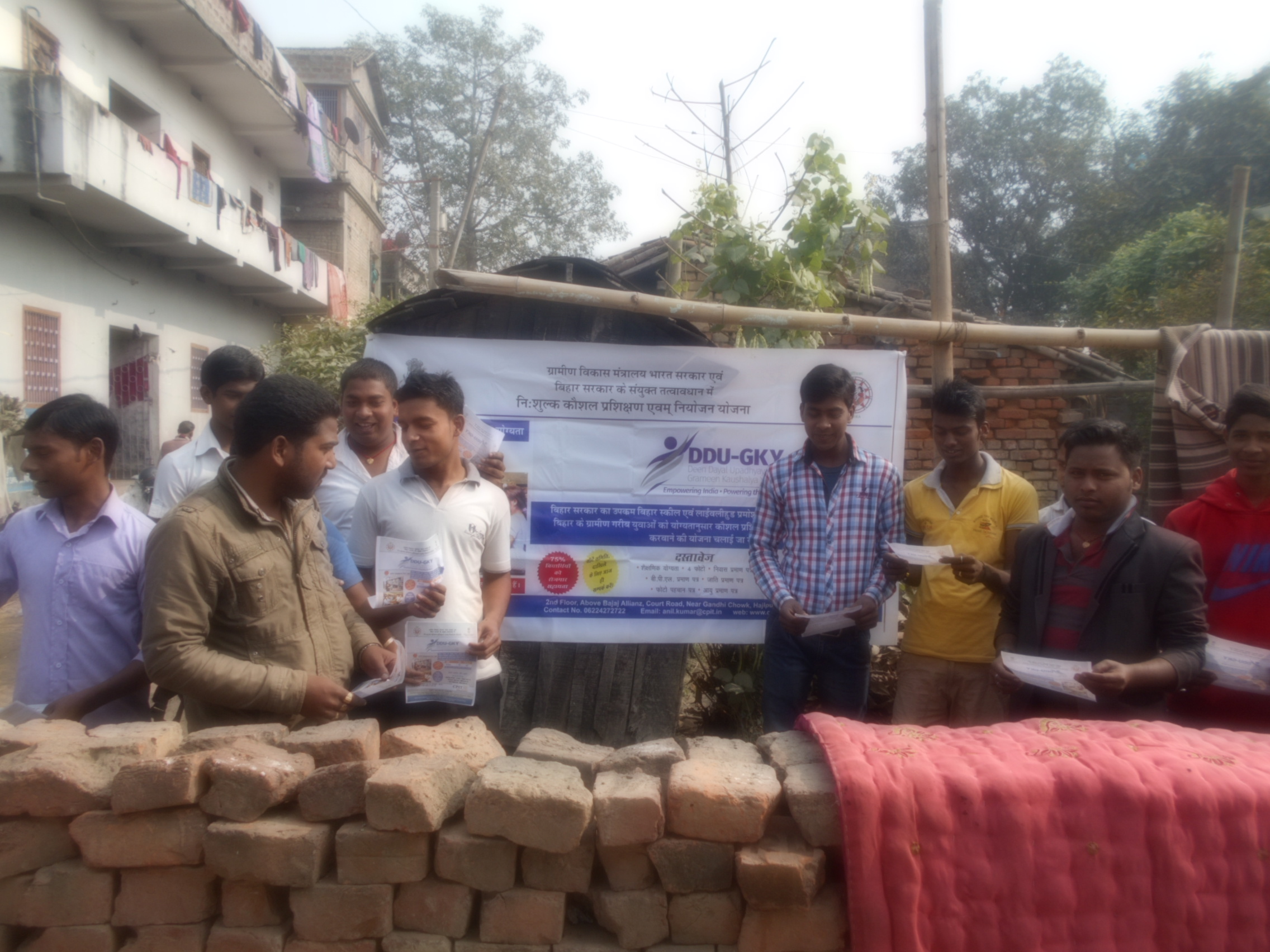|
|
 |
Kaushal SamacharFeb 2018, Issue 2 |
 |
|
|
|
|
|
Release of the first issue of Kaushal Samachar
Union Minister of Rural Development, Panchayati Raj and Mines Shri Narendra Singh Tomar released the first issue of "Kaushal Samachar" the e-newsletter of DDU-GKY, NIRD & PR, dedicated to sharing skill related news, information and developments. Shri Narendra Singh Tomar visited the NIRD & PR campus on 25 Jan 2018 and addressed the faculty.
|
|
|
|
|
|
|
|
|
|
| |
|
Kaushal Samachar is also about sharing best practices of various stakeholders of DDU-GKY in skilling the youth. This issue of Kaushal Samachar brings you best practices and heart warming stories from Odisha, best practices from the SSC of the month, a research article from PIA of the month and good to know information on LMIS. We begin with best practices of ORMAS shared by Shri. Shankar Dutt Kabdal, Director of Monitoring and Evaluation, DDU-GKY, NIRD & PR Hyderabad.
DDU-GKY Best Practices at Odisha Rural Development and Marketing Society (ORMAS)
Odisha Rural Development and Marketing Society (ORMAS) is an autonomous professional body under the aegis of Panchayati Raj Department, Government of Odisha. Registered under Societies Registration Act-1860, it has been rendering yeomen services in livelihood promotion and rural product marketing in Odisha since 1991. The Society plays critical role in facilitating marketing of rural products and in giving competitive edge for its promotion. A large proportion of rural households, producers in general and the rural artisans in particular who live in less favoured, marginal or more complex environment get advantage from it. At present, it is functioning in all the 30 districts across the State under the direct supervision of the respective district administration. There are 30 dedicates persons working in the State Office and 60 persons in the districts dedicated to DDU-GKY project. Shri B. N Das has been in the leadership role for driving DDU-GKY projects in the state from the beginning and hence has ownership and continuity in decision making. To read more, scan the QR code or click here.
Article by
Shankar Dutt Kabdal
Director M&E, DDUGKY, NIRDPR
|  |
Straight from the heart: Bandana Singh
|
Every person’s story starts with a family and family normally means having parents, siblings and relatives. We are fortunate enough to have such a family in our lives, but everyone is not so fortunate to have a family. However, children deprived of such families in their lives are often blessed with a family comprising lots of kids like them, who do not have parents, in the form of an orphan home. Bandana Singh is one of them, she is a girl, gentle by nature and comes from PETER & PAUL HAPPY HOME, Phulabani, Kandhamal. She did her schooling from National School of Open Schooling.
She did not know what to make of her life, just as every normal child generally is, in the phase of choosing her career. Then she got a chance to join DDU-GKY Roshni training program in Quess Corp Ltd, Koraput. She underwent training in ITES (non-voice) trade for three months. Throughout the training duration, she remained regular, active and participated in all the classes as well as extra-curricular activities. Her humble and jolly nature, respect towards others and always carrying a smile on her face made her batch mates call her SMILEY.
|
 Bandana Singh with Ratan Tata |
Her dedication and hard work paid off in the end when she got selected for the post of trainee in TASL (Tata Advanced System Ltd), Hyderabad after clearing four rounds of interview with an annual package of Rs.1, 09,984 (CTC).
She has proven herself, like rivers, which in spite of facing lot of hurdles in their course of life, still manage to find their way.
Contributed by
M&E Team Members, DDUGKY, NIRDPR
|
|
|
|
| DDUGKY Stall at Deccan CSR Summit 2018, Hyderabd Marriott Hotels and Convention Centre | |
|
DDUGKY, NIRDPR was invited to take part in the Deccan CSR Summit 2018 organised by NGO BOX on 22nd Feb, 2018. This summit was for the Southern states, Maharashtra and Orissa. NIRD & PR set up an information stall of DDU-GKY which received impressive footfalls. Visitors to the stall included Honourable Members of Parliament (Lok Sabha), Industry Experts and Organisations interested to take up DDU-GKY project. NIRD & PR's participation has enhanced the visibility of the DDU-GKY project and a few collaborations with industry are expected as an outcome.
 Shri Bhagwanth Khuba, Honourable Member of Parliament
(Lok Sabha), Bidar, Karnataka |
 Prof. A. Seetaram Naik, Honourable Member of Parliament
(Lok Sabha), Mahabubabad, Telangana |
 Shri CH. Malla Reddy, Honourable Member of Parliament (Lok
Sabha), Malkajgiri, Telangana |
| |
|
|
| |
|
|
|
Live training dashboard that will enable MoRD and SRLM to view the status of training in real time.

|
|
|
|
|
|
|
Proposed Training for the Month of March-18
To register, please click on the workshop titles
|
|
|
|
|
|
|
DDU-GKY introduces virtual classes
DDU-GKY Training in association with MIS team launched its first two thematic virtual classes on e-SOP and MPR on 17 and 18 January. A total of 52 participants attended the online training. In order to meet the demand, starting February, these sessions will be conducted on a fornightly basis. The sessions are open to SRLM officials and PIAs. Each virtual session will have a capacity of 30 participants. Registrations will be confirmed on a First Come First Serve basis. To register, please access the link on the March calendar.
Kaushal Praveen Training of Trainers completes 6th batch
Notification No. 61/2017 2.iii, requires NIRDPR to conduct Training of Trainers for PIAs and other training partners. Further, there is a need to baseline and benchmark training quality in PIA centres across the country and match it with industry standards.
To that end NIRD & PR has launched Kaushal Praveen, Training of Trainers to sharpen training skills of trainers. This training focuses on a learner-centric approach to skill training, with techniques to maximise practice and application of learning.
NIRD & PR has delivered this training to six batches of PIA trainers by now. The impact of this training is being evaluated through live labs at PIA centres and will be published shortly.
Kaushal Praveen for the PIA Trainers is being conducted state-wise and a total of 2000 trainers are expected to be trained on the methodology this year.
|
 Kaushal Praveen fifth batch |
 Activity @ Kaushal Praveen Training |
 Activity @ Kaushal Praveen Training |
|
| SSC of the Month: Tourism and Hospitality Skill Council | |
|
Tourism and Hospitality Skill Council has a digital platform called the "Skill Grid" that connects THSC certified candidates to the industry, that bridges the gap between demand and supply in the sector.
Read More..
| |
|
|
| |
|
PIA of the Month
Skill Development in India: Challenges and New Vistas
The economic prosperity and human development of any nation primarily depends on the magnitude of skills and knowledge the national bestowed with. Given the demographic dividend available with the nation, India is seriously concerned to harness their human capital in terms of knowledge and skills of world standard to address the prevailing poverty and unemployment issues. While there has been an influx of opportunities on account of globalization and digitalization, it has equally intensified competition among the workforce, both within the country and across the globe. Further, the competition among firms and industry has also been intensified, compelling them improve their work efficiency and quality of products and services offered by them. This is forcing them to hire fewer, but more skilled, workers. Thus, all economies today are looking for skilled manpower of global standards and employ advanced technology to boost their industrial output and ensure economic progress. Thus, the fruits of globalization and advanced technology are available only to those economies which are bestowed highly skilled and knowledgeable human capital. Skill development has become a priority in India to bridge the widening skill gap between industry needs and available workforce. About 90% of the jobs in India are reportedly “skill based” and require vocational training. The current skill development initiatives of various government ministries and departments are focused on organized sector workers only. Furthermore, initiatives for the organized sector have gained momentum over the last few years due to rapid advancement in the country’s manufacturing and services sector. On the other side, there is no robust skill development framework for the unorganized sector, due to which a majority of workers employed in the sector lack any kind of formal skill development training. Around 85% of the workforce in the unorganized sector does not imbibe any form of skill development, formal or informal (FICCI 2013: 8-9). Hence, it is the pertinent time for the Indian economy to devise and implement appropriate skill development framework to accelerate the skill development process and emerge as the global hub for knowledge and skills. THE OPPORTUNITY: India is one of the youngest nations in the world, with more than 54% of the total population below 25 years of age and over 62% of the population in the working age group (15-59 years) at present. Thus, it has the potential to fill the expected shortfall in the ageing developed world by supplying needed skilled workforce.
Reports indicate that India is expected to become one of the most populous nations by 2025, with a headcount of around 1.4 billion. The country’s population pyramid is expected to “bulge” across the 15–64 age bracket over the next decade. Around 64% of India’s population is expected to be in the age bracket of 15–59 years by 2026, with only 13% of the total aged above 60 years. Thus, by 2020, India is poised to become the world’s youngest country, with an average age of 29 years, and account for around 28% of the world’s workforce.(FICCI 2013: 7). Other reports reveal that India shall emerge as the third largest car market by 2020 after the US and China. The solar industry is predicted to generate between 1,17,000 to 2,35,000 jobs by 2020. The most significant growth will come from the manufacturing sector, which will add 32% (27.88 million) of the new jobs. Trade will be next with 24.24 million jobs, following construction with 15.13 million. Tourism-related employment, information technology (IT) and IT-enabled services (ITeS), and financial services will also grow. In the longer term, India is aiming to create 100 million jobs in the manufacturing sector by 2020 (Kelly Services Inc. 2012). According to the Manpower Employment Outlook Survey for the first quarter 2015, it was reported that 44% of employers anticipate an increase in staffing levels. After adjusting the data for seasonal variation, the Outlook stood at +45%. Across the globe, the hiring confidence was highest in India at +45%, followed by Taiwan with +43% and New Zealand with +28%. The US reported just +16% for the first quarter (Manpower Group Services India Pvt. Ltd. 2015).
THE CHALLENGES: The country presently faces a dual challenge of severe paucity of highly-trained, quality labor, as well as non-employability of large sections of the educated workforce that possess little or no job skills. It is estimated that only 2.3 % of the workforce in India has undergone formal skill training as compared to 68% in the UK, 75% in Germany, 52% in USA, 80% in Japan and 96% in South Korea. Read the full paper
Article by
Dr. D.Hanumantha Rao
Assoc. Prof. SRTRI
|
|
|
|
|
|
| The information on National Labour Market Information System (N-LMIS)
Courtesy: Ministry of Skill Development and Entrepreneurship Annual Report 2016-17 | |
|
NSDA has developed a single window platform to aggregate supply and demand trends in the Indian vocational education and training space, referred to as the National Labour Market Information System (LMIS). The portal was formally launched by Honourable President of India on the 15th of July 2016. It is now known as Skill Exchange Labour Market Information System.
LMIS is an integrated set of institutional arrangements, procedures, mechanisms and data systems designed to produce labour market information as per global standards and best practices. The system brings together statistical (quantitative) and non-statistical (qualitative) information concerning labour market actors and their environment and generate key analysis and reports which can be used for various policy interventions by different government stakeholders, as well as by the industry at large.
The data on the National LMIS is displayed in the form of 10 National Repositories namely Trainers, Training Centers, Training Providers, Assessors, Assessment Agencies, Employers, Trained Candidates, Courses and Prospective Candidates each contributing to build a holistic picture of the skill development ecosystem in the country. As on date, 65 lakh trained candidate data from 4 different central ministries are reflected on the LMIS which includes 7 major central skill development schemes.
NSDA has developed a roadmap for integrating all remaining data sources including States, Central Ministries and other Agencies working in the sill development space. The first step in this direction is to undertake a scoping study of all skill development MIS systems in the country. Following this study, NSDA will develop an action plan for state integration and roll out which will include strengthening of state and institutional MIS systems in a systematic phase wise approach.
The employment linkage on the LMIS has been facilitated through integration with the National Career Services Portal maintained by the Ministry of Labour and Employment. Through this integration, candidates trained and certified through Government Schemes and programs will reflect as potential job seekers on the NCS portal. NSDA has also initiated the process of signing MoUs with all major employment agencies and Job portals for sharing of candidate data available on the National LMIS. As on date, NSDA has signed MoUs with Town Labour Technologies Ltd., Baba Jobs, Monster.com and Saral Rozgar. This will ensure that candidates have multiple avenues facilitating employment linkages through the system.
The LMIS will make citizen services accessible over the Internet, through mobile phones, kiosks, and call centres as well as through personal computers, setting forward a vision for electronic service delivery that does not do away with the need for personal contact, but rather supports better management with the infusion of technology. The system provides a consolidated and unified view of various stakeholders at any given point of time and empowers the Government and agencies to take informed decisions by providing intelligent and insightful reports, as required. Web Link for reference
Contributed by
Atul Nath MS, DDUGKY, NIRDPR
| |
|
|
| |
|
Gallery
 Verification @ Employer Loacation |
 Job Mela organized at Bihar |
 Verification @ Employer Loacation |
 Live demo by candidates |
 Lab |
 Candidates at OJT |
|
|
|
|
|
|